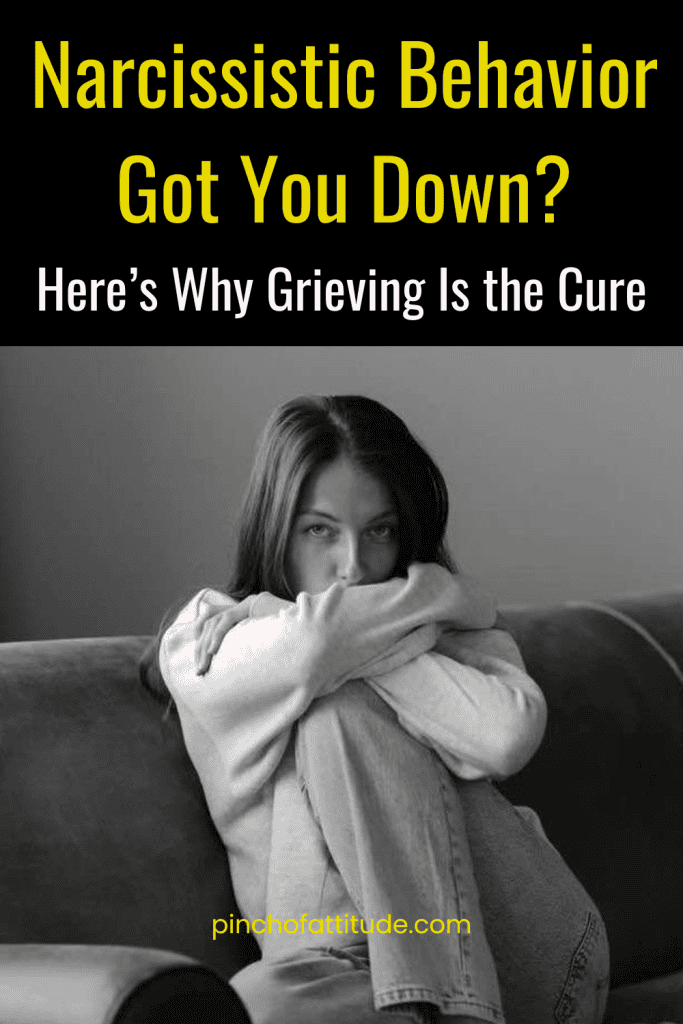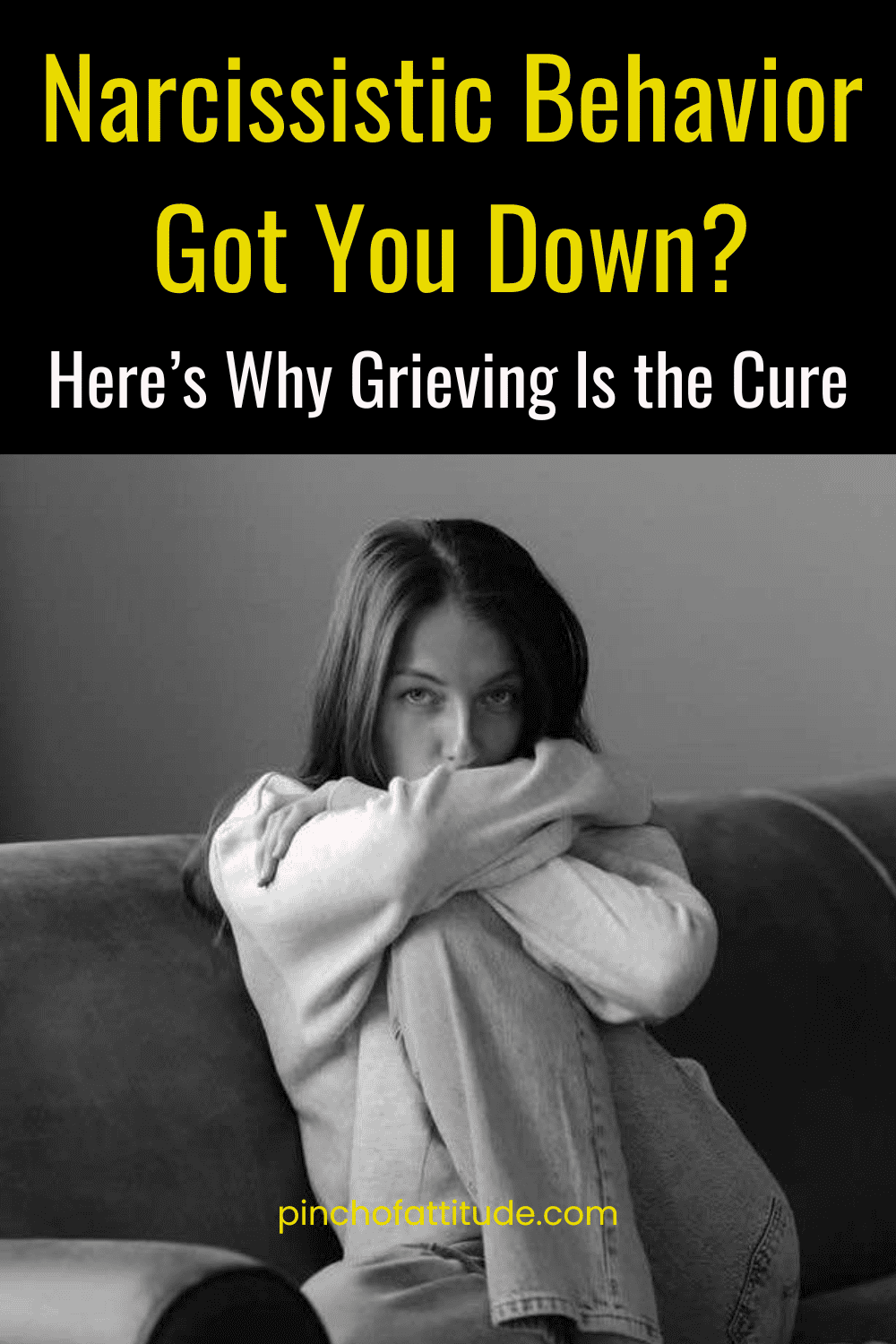You’ve just left a narcissistic relationship, whether it’s family or friends, let me be the first to say, congratulations on having the courage to take one of the hardest steps in your life.
So, instead of feeling relief, you’re overwhelmed with sadness, trust me I get it. I was there myself a few years ago. You might be wondering, “Why am I grieving over someone so toxic?”, yep! I was too.
Here’s the truth: grieving after narcissistic abuse isn’t just common, it’s quintessential. It’s your mind and body’s way of processing the trauma, the manipulation, and the loss of what you thought your life was.
It may seem counterintuitive, but this grief is a sign that you’re on the right path toward healing.
In this article, I’ll dive into why grieving after narcissist abuse is not only normal but a very important step in reclaiming your life and sanity.
- Grieving after narcissistic abuse is essential for emotional detox, helping you process and release the pain and confusion caused by the toxic relationship.
- Fully experiencing grief allows you to rebuild self-trust, gain clarity on the past, and avoid repeating destructive patterns in future relationships.
- Embracing grief is crucial for reclaiming your self-worth and paving the way to a joyful, empowered life after abuse.
Table of Contents
Why Grief Hits So Hard After Narcissistic Abuse?

When you’re involved with a narcissist, your entire world gets warped. The person you fell for or loved, the life you thought you were building, and the love you believed you had, it all start to unravel.
Once you step out of that toxic fog, the reality hits like a ton of bricks. This is where grief comes in.
You’re not just mourning the loss of a relationship; you’re grieving the person you thought they were, the future you envisioned, and even parts of yourself that got lost along the way.
The Loss of Illusions

One of the hardest pills to swallow is the realization that the person you loved was a facade. Narcissists are experts at creating an idealized version of themselves to hook you in.
You might have loved them deeply, but it was an illusion—one meticulously crafted to manipulate and control you.
Grieving this loss is essential because it allows you to let go of the false image and start seeing things for what they really were. It’s the first step in breaking the trauma bond and setting yourself free.
Mourning Who You Were

Before the narcissist, you were someone else. Maybe you were more confident, more carefree, more you. But narcissistic abuse changes you. It erodes your self-esteem, fills you with self-doubt, and often leaves you questioning your own reality.
Grieving who you were before the abuse is a vital part of healing. It’s about acknowledging that you’ve lost parts of yourself but also recognizing that you have the power to rebuild and become even stronger.
It’s Okay to Feel Conflicted

After leaving a narcissistic relationship, whether they are your family, friends, or lover, your emotions might feel like a chaotic storm.
You could be angry, sad, relieved, and guilty, all at once. The complexity of these feelings can be overwhelming, but it’s important to understand that it’s all part of the grieving process.
Anger and Sadness: Two Sides of the Same Coin
It’s normal to feel anger towards the narcissist for what they did to you. This anger is a natural reaction to the betrayal and manipulation you endured.
But right alongside that anger, you might feel a profound sadness—not necessarily for them, but for what could have been.
These conflicting emotions are a part of grieving, and accepting them is crucial for moving forward.
The Guilt Trap
You might also experience guilt for staying as long as you did, guilt for falling for their lies, or even guilt for leaving. This is another common emotion, but it’s one you must confront.
Understand that the narcissist is a master manipulator, and they likely conditioned you to feel responsible for the relationship’s failure. Letting go of this guilt is essential for your emotional freedom.
Why Grieving Is Very Important For True Healing?

Grief isn’t something you can skip over or speed through; it’s a necessary process that helps you come to terms with your reality.
Without fully experiencing and processing your grief, you risk carrying unresolved emotions into your future relationships or even back into the same toxic patterns.
But why exactly is grieving such a critical part of healing after narcissistic abuse? Let’s break it down further.
Grieving Is the Foundation of Emotional Detox
Think of grief as an emotional detox. When you’ve been in a relationship with a narcissist, your emotional system gets flooded with toxic energy—fear, doubt, anger, confusion.
Grieving is like flushing all that poison out of your system. It’s not pleasant, and it definitely doesn’t happen overnight, but it’s absolutely essential.
Just like your body needs time to cleanse itself after a night of bad decisions (hello, tequila), your emotions need time to purge the trauma. Skipping this step is like ignoring the hangover and going straight to another round of shots—tempting, but ultimately disastrous.
Grieving Brings Clarity
When you’re caught up in a narcissistic relationship, it’s like you’re living in a fog. The narcissist’s manipulation and gaslighting keep you constantly questioning your reality.
After the relationship ends, grief is what clears that fog away. It’s through the grieving process that you start to see things for what they really were. You begin to understand the depth of the manipulation, the extent of the lies, and how deeply you were affected.
This clarity is painful, yes, but it’s also incredibly liberating. It allows you to separate the truth from the lies and start building a new, more honest narrative for yourself.
Grieving Helps You Rebuild Trust In Yourself

Narcissistic abuse does a number on your self-trust. The constant manipulation can leave you questioning your own judgment, doubting your perceptions, and feeling like you can’t trust yourself anymore.
Grieving is a way to reconnect with your inner truth. As you work through the pain and the loss, you start to rebuild that trust in yourself. You begin to recognize that your feelings were valid, that your instincts were often right, even if they were clouded by the narcissist’s influence.
This process of grieving and self-reflection helps you regain confidence in your ability to make decisions and protect yourself in the future.
Grieving Allows for Emotional Release

In a narcissistic relationship, you’re often forced to suppress your emotions. Whether it’s to avoid triggering the narcissist’s wrath or because you’ve been conditioned to believe your feelings don’t matter, you learn to bottle things up.
Grieving after the relationship ends is like opening up that emotional bottle and finally letting everything out. It’s an opportunity to feel everything you couldn’t feel while you were still in the relationship—anger, sadness, disappointment, relief.
This release is crucial because those pent-up emotions if left unchecked, can lead to long-term emotional and physical health issues.
Grieving Prevents Repetition of The Cycle
One of the scariest things about leaving a narcissistic relationship is the fear that you might end up in another one. Without fully grieving and processing the experience, there’s a risk that you could repeat the same patterns.
Grieving allows you to dissect the relationship, understand the red flags you missed, and recognize the parts of yourself that were vulnerable to the narcissist’s manipulation.
By doing this deeply emotional work, you’re equipping yourself with the tools and awareness needed to avoid falling into similar toxic dynamics in the future.
It’s like grief gives you a road map to navigate away from those old, destructive paths and towards healthier, more fulfilling relationships.
Grieving Helps You Rediscover Joy

It might sound strange, but grief can lead to joy. After all the tears, the anger, and the heartbreak, there comes a time when you start to feel lighter. That’s because grief, when fully processed, makes space for new emotions—hope, excitement, happiness.
You start to reconnect with the things that bring you joy, the activities that make you feel alive, and the people who genuinely care about you. Without going through the grief, these moments of joy can feel out of reach.
Grieving gives you permission to move forward, seek out new experiences, and embrace the happiness that you might have forgotten existed.
Grieving Restores Your Sense of Self-Worth
Perhaps one of the most insidious aspects of narcissistic abuse is how it erodes your sense of self-worth. You may have been made to feel like you’re not good enough, like you’re lucky to have the narcissist, or like you deserve the treatment you received.
Grieving helps you challenge and dismantle these harmful beliefs. As you process the abuse, you start to see that the narcissist’s actions were a reflection of them, not you. You begin to reclaim your value, recognizing that you deserve respect, kindness, and love.
This restored sense of self-worth is essential for your overall healing and for setting the standards for how you want to be treated in future relationships.
How to Navigate Your Grief?

Grieving after narcissistic abuse is a deeply personal journey, but there are practical steps you can take to help navigate this emotional terrain.
Acknowledge Your Feelings
The first step in dealing with your grief is acknowledging it. Don’t try to push your feelings away or pretend they don’t exist. Give yourself permission to feel everything, even if it’s painful or confusing. Write in a journal, talk to a therapist, or confide in a trusted friend—just get those feelings out in the open.
Take Time to Reflect
Reflection is a powerful tool during the grieving process. Take some time to think about what you’ve been through, what you’ve lost, and what you’ve learned. This doesn’t mean dwelling on the past, but rather, understanding it so you can move forward with clarity and purpose.
Create New Routines
Narcissistic relationships can leave you feeling disoriented and disconnected from your own life. Creating new routines can help ground you and give you a sense of control. Whether it’s starting a new hobby, setting fitness goals, or simply sticking to a daily schedule, these routines can be incredibly healing.
Practice Self-Compassion
Be kind to yourself during this time. You’ve been through a lot, and healing is not a linear process. There will be good days and bad days, and that’s okay. Practice self-compassion by giving yourself grace and understanding as you work through your grief.
Related Posts:
- Why The Anger Stage Is a Very Important Part of Healing From Narcissist Abuse?
- Why Are You So Tired After Leaving a Narcissist?
- 7 Stages of Narcissistic Abuse Recovery: Are You There Yet?
- 20 Affirmations For Narcissistic Abuse Survivors
- 8 Typical Trauma Responses You’ll Face After Narcissistic Abuse
Frequently Asked Questions
Why is grieving important after narcissistic abuse?
Grieving is important because it helps you process and release the emotional trauma caused by the abuse.
How does grieving help in rebuilding self-worth?
Grieving allows you to confront and dismantle the harmful beliefs imposed by the narcissist, helping you reclaim your self-worth.
Can I heal from narcissistic abuse without grieving?
Healing without grieving is difficult, as unprocessed grief can lead to unresolved emotions and repeated toxic patterns.
What should I expect during the grieving process?
Expect a range of emotions, including sadness, anger, and confusion, all of which are normal and necessary for healing.
How long does the grieving process take after narcissistic abuse?
The grieving process varies for everyone and should be allowed to unfold naturally, without rushing.





Thank you so much for writing this. I am in the grieving stages of finally have to go through the pain of having to go no contact with my sister, whom I love very deeply, but who has abused me for decades. I didn’t even know what narcissism was until 2 weeks ago, but now everything is so clear. I haven’t been angry, just deeply, deeply sad. I reached the point where I couldn’t take any more abuse. I think the reason I’m not angry is because I’ve always genuinely forgiven her and let go of the anger, so it has never been a cumulative issue. But I am going through deep, deep grief because I love her so much. I’m NOT tempted to let her back into my life because I understand clearly that she is never going to change, and I’ve had enough. I’ve saved your article and will print it out. Thank you again. I really needed this.